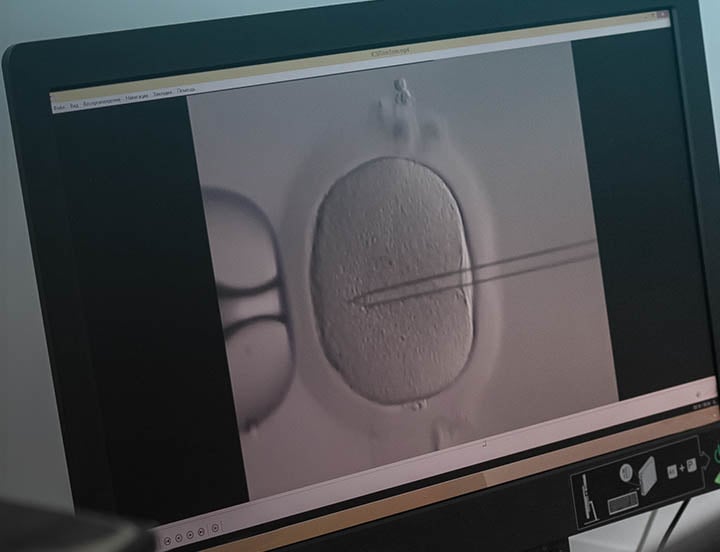Care is an international fertility group and the largest provider of IVF services in the UK. Focused on innovation and the highest quality clinical care, it is how they combine patient centricity and scientific excellence that makes Care one of the world’s leading IVF groups.
The challenge
In 2020, Care Fertility (Care) challenged BJSS to find a way to improve and accelerate the process of embryo selection during IVF using the power of artificial intelligence (AI). Care was already a market leader in embryo selection, and identified this project as an opportunity for further innovation.
During optimal IVF treatment, multiple eggs are collected and fertilised to produce several embryos. From these, embryologists must select the one they believe has the best chance of life. This procedure is critical to achieving a successful pregnancy but, as these embryos often look incredibly similar, the standard selection process has been shown to be fairly subjective.
To make this process more reliable, Care utilised time-lapse incubators to develop an embryo selection tool. This tool, or algorithm, uses data recorded from key events in the developing embryos to calculate scores relating to their potential for becoming a baby.
However, these key events still have to be identified and annotated by manual inspection of thousands of time-lapse images by trained embryologists. This time-intensive work creates training and quality assurance challenges. Care recognised that accelerating this process could have major benefits for embryologists and, subsequently, their hopeful patients.
Care engaged BJSS to investigate whether AI could be used to automatically annotate images with the same or greater degree of accuracy as manual annotation.
The solution
BJSS’ data scientists worked side-by-side with Care’s embryologists, conducting a series of experiments into the potential for AI to improve embryo selection. Close collaboration between the teams was essential to ensure the complexities of embryology were understood and accurately modelled.
Within nine months, BJSS had developed a robust deep learning model, applying modern techniques in computer vision and time-series analysis, which when applied to Care’s existing embryo selection tool, performed at least as well as expert manual annotation.
The model draws from a significant historic data set of almost 500 million images and two million manually-annotated events (from eight UK Care clinics collated over a decade). With this information, the model can not only identify the key stages in an embryo’s development, but also predict when these are likely to happen. Rather than having to sift through thousands of images, embryologists now only have to verify those selected by the model.
Once the AI model had been validated, BJSS moved on to developing a platform to host it, and integrating it with the embryoscopes and various other technologies across Care’s estate. The new cloud-based platform ingests embryoscope image data, making it available for embryologists to view via a modern web interface. During ingestion, the platform augments the images with relevant metadata, and the machine learning models are used to auto-annotate the embryos. Images are ingested and annotated hourly, enabling embryologists to view the progress of the embryos.
At the time BJSS developed and delivered this model, there were only a handful of other solutions on the market developed on combined and relatively small datasets. The work of BJSS’ technologists – immersing themselves in a highly-complex and unfamiliar scientific field – combined with Care’s expertise and expansive dataset, enabled them to provide a far more accurate solution.
The outcomes
In less than eighteen months, BJSS developed, tested and productionised Care’s proposition – taking it from an idea to a fully-operational service with life-changing potential. The project is now being rolled out across Care’s network of 15 laboratories in the UK and Ireland, with a view to introducing this into their international clinics in Spain and the US at a later date.
Due to the collaborative work of BJSS and Care, the role of the embryologist has been transformed. This tool drastically reduces expert time spent on embryo assessment, freeing up approximately six months of embryologist time per year – half an FTE. It also reduces the time spent on training to get embryologists to the standard needed to accurately analyse these images. These significant time savings will enable embryologists to focus on patient care, research, and protocol improvements.
But the benefits go beyond efficiency; crucially, this tool has direct impact on patient treatment. By increasing the reproducibility and reliability of the embryo selection process and the accuracy of predictions, Care can ensure they give patients their best chance of having a child.
“The BJSS team approached this complex project thoroughly and confidently. They communicated regularly and clearly. The project hit a few challenges which were tackled swiftly and competently by the talented multidisciplinary BJSS team. The resulting minimum viable product is world-class and something BJSS and Care Fertility can all be proud of. Importantly, the ML tool, developed by BJSS, to help Care Fertility assess human embryos, will help improve the chance of patients reaching their goal of having a baby.”
Alison Campbell, Care Fertility Chief Scientific Officer

